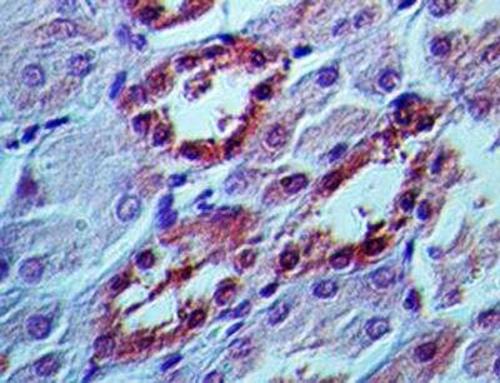APIP Mouse Monoclonal Antibody [Clone ID: 19F461]
Frequently bought together (3)
beta Actin Mouse Monoclonal Antibody, Clone OTI1, Loading Control
USD 200.00
Other products for "APIP"
Specifications
| Product Data | |
| Clone Name | 19F461 |
| Applications | IHC, WB |
| Recommended Dilution | Immunohistochemistry-Paraffin, Immunohistochemistry: 5 ug/ml, Western Blot: 1-2 ug/ml |
| Reactivities | Human |
| Host | Mouse |
| Isotype | IgG2b, kappa |
| Clonality | Monoclonal |
| Immunogen | The antibody was developed against a full-length His-tagged recombinant APIP. |
| Formulation | PBS containing 0.05% BSA, 0.05% Sodium Azide. Store at 4C short term. Aliquot and store at -20C long term. Avoid freeze-thaw cycles. |
| Concentration | lot specific |
| Purification | Protein G purified |
| Conjugation | Unconjugated |
| Storage | Store at -20°C as received. |
| Stability | Stable for 12 months from date of receipt. |
| Gene Name | APAF1 interacting protein |
| Database Link | |
| Background | The mammalian homologues of the key cell death gene CED-4 in C. elegans has been identified recently from human and mouse and designated Apaf1 (for apoptosis protease-activating factor 1). Apaf1 binds to cytochrome c (Apaf2) and caspase-9 (Apaf3), which leads to caspase-9 activation. Activated caspase-9 in turn cleaves and activates caspase-3 that is one of the key proteases, being responsible for the proteolytic cleavage of many key proteins in apoptosis3. Recently, Cho et al have identified a new Apaf-1 Interactiong Protein (APIP) also known as CG129 and MMRP19, as a negative regulator of ischemic injury. APIP competes with Caspase-9 binding site of Apaf1. APIP is predicted to code for a 204 amino acid. An isoform of APIP, APIP2 encodes a 242 amino acid protein, which is an alternative splicing variant differing in its N-terminus from APIP. APIP transcript is ubiquitously expressed in most adult tissue with high expression in skeletal muscle, heart, and kidney. |
| Synonyms | APIP2; CGI-29; CGI29; hAPIP; MMRP19 |
| Reference Data | |
| Protein Pathways | Cysteine and methionine metabolism, Metabolic pathways |
Documents
| Product Manuals |
| FAQs |
| SDS |
{0} Product Review(s)
0 Product Review(s)
Submit review
Be the first one to submit a review
Product Citations
*Delivery time may vary from web posted schedule. Occasional delays may occur due to unforeseen
complexities in the preparation of your product. International customers may expect an additional 1-2 weeks
in shipping.






























































































































































































































































 Germany
Germany
 Japan
Japan
 United Kingdom
United Kingdom
 China
China










